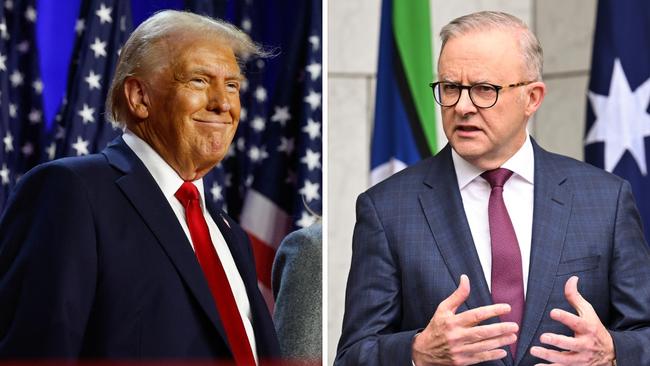Anthony Albanese facing diplomatic minefield on Trump’s tariffs – it could so easily blow up in his face


The only way forward for Albanese is to convince Trump that exempting Australian steel and aluminium producers is in the best interests of the US.
Obtaining this exemption will be seen as a litmus test of his success in engaging with the Trump administration. If he fails, he will be seen as the leader who saw Australia lose its special standing with America.
Albanese is being held to this high standard because Malcolm Turnbull was able to secure exemptions when Trump was last in power. But negotiating the exemptions back in 2018 was notoriously difficult – and it will likely be even harder this time around.
Trump is a true believer in tariffs as an economic instrument in addition to wielding them as leverage in his dealings with other nations. America under Trump is changing and Australia may no longer receive the same treatment it has previously.
It is Trump who should bear the responsibility if Australia is seen to have its relationship downgraded. But Albanese knows he will wear the political fallout at home. The politics are stacked against him.
Albanese is now being forced into direct talks with Trump ahead of the Australian election – something fraught with danger.
Any engagement before the federal election always ran the risk of making Australia more of a target for Trump at the worst point of the political cycle for Albanese.
It is vital that, in Albanese’s upcoming discussion with Trump, that the US President agrees to consider an exemption. A blanket repudiation would be a humiliation. Albanese must also avoid the discussion opening up a Pandora’s box of other issues, including the poor state of Australian defence spending, the stabilisation of relations with Beijing or even the terms of the AUKUS deal itself.
What will Trump demand in return? Albanese may be thinking of what he can offer the US President. But deal making with Trump could create entirely new and unexpected problems for him.
On paper, there is a compelling case for an exemption to be made – Canberra is a close ally, the US has a trade surplus with Australia and Canberra is investing $3bn in the US submarine industrial base. But the normal rules no longer apply.
Trump’s nominee for US trade representative is Jamieson Greer who previously worked as the chief of staff to Robert Lighthizer who held the position when Trump was last in power.
Lighthizer is a true believer in tariffs and supported putting them on Australia.
Turnbull has already documented how precarious negotiating the exemptions was the first time around and the difficulties he faced in persuading Trump over his key trade advisers, including Lighthizer and Peter Navarro.
Turnbull reached a handshake deal with Trump at the G20 meeting in July 2017, but lobbied him directly in March 2018 and wrote to him again in April that year when “our embassy in Washington was pretty pessimistic about our prospects of maintaining our exemption”.
Turnbull managed to win the day. His argument was that, by agreeing to an exemption on tariffs and quotas, America could demonstrate its commitment to “fair and reciprocal” trade given it had complete and free access to the Australian market. This would incentivise other nations to offer better trading terms to the US.
Trump was persuaded the exemption was in his interest. To succeed, Albanese will need to convince him a second time.
History suggests he will need to embark on an intense lobbying campaign and be prepared to face strong resistance.
The opposition must also tread carefully. If Peter Dutton makes this a test of leadership for Albanese, any exemption for Australian exporters will hand Labor a major victory.
If Dutton wins the election, negotiations with Trump may also prove no less challenging.



Donald Trump’s proposed 25 per cent tariffs on steel and aluminium should be a reality check for those who thought Australia was a special case. It also presents a series of political traps for Anthony Albanese.